|
By Katie Baker Vocation: a strong feeling of suitability for a particular career or occupation. (Oxford Dictionary) I will be upfront with you. I do not feel a strong feeling of suitability for my chosen occupation. To be honest, I was not exactly proactive in my choice. Post-Bible college, my only requirements for a decent job were 1) not working on Sundays and 2) stability of schedule. The first requirement was God-focused; the second was me-focused, and I did not pray as much about any of it as I should have. The result of this lackadaisical approach is that I have found myself working in one of my least favorite fields for the last 10 years. Yup. 2022 was my big 1-0 anniversary with its resulting bump in paid time off. The other side effect is that I do not, and never really have, felt called or suited by God to work in the banking industry. I have always enjoyed words, not numbers—ideas and stories, not finance. Therefore, I feel called by God to something that is not my 9-to-5 job. Something that does not pay the bills. I have been a writer and a storyteller for as long as I have been able to read, and that is where God has placed my passion. When I was 23, this sort of disconnect did not bother me; I was mostly worried about paying off my student loans as fast as I could. Now that I am 33, the line between what I am doing and what I feel I should be doing feels muddled. Is it okay with God if we spend all our life doing what we view as a meaningless job? Would God even agree that there are meaningless jobs? (Do I even agree with that supposition?) Can I be true to my calling while spending all my mental energy for a paycheck? It’s a rough, if not non-existent, accomplishment some days. Then I think: Well, sure. Sometimes God calls people to certain vocations that also serve as their “9-to-5”. We most associate missionaries and pastors with this reality. But the Bible also does a lot of talking about toil and the sweat of our brow—results of any vocation, whether God-called or chosen of necessity. After all, many of the figures called by God in the Bible had to have “day jobs” to support their ministries: Paul was a tentmaker. Peter was a fisherman. Lydia was a seller of purple. So why do I feel such dread and shame when someone I have not seen in forever asks, “Well, what are you up to now? You still work at _____?” It never fails. I always cringe. “Yup. I’m a blah-blah-blah clerk. Very exciting, I know.” If anyone asked the Apostle Paul what he was up to lately, I doubt he was replying with an abashed, “Still sewing those tents.” Pretty sure it was more like: “Spreading the Good News about Jesus Christ.” I doubt his occupation entered his mind at all when the shekels and generosity of the churches grew a little tight. Paul’s life mission was not to sew tents, even though that is an admirable profession; it was to reach people with the gospel of Christ. And isn’t that every follower of Christ’s first and foremost vocation? To show the truth, light, and compassion of Jesus to whomever is around, no matter what we may be doing? Who is to say I cannot proudly answer the question “Oh, what do you do?” with “I’m a lover of Jesus. A writer. And a blah-blah-blah clerk”? God may call some of us to make a living with the calling he has given us, and he may call some of us to scribble into notebooks and post on blogs, never really knowing who needs our voice and never really knowing if it makes a difference. He may call some of us to punch a clock at a job that intellectually bores us so that we can pay the bills for—or (maybe!) have a break from—the God-centered work we are called to do in our spare time. The word vocation conjures up more than just a 9-to-5 paper-pushing or ditch-digging job; it conjures up a sense of purpose and completeness. God calls us to a higher purpose than pursuing money or simply paying the bills, knowing full well that we will still need to pay the bills. In my life, my higher calling often collides with my day job by supplying me with inspiration to write about, and sometimes it opens up my highest calling when I am given the opportunity to show a co-worker or a customer the grace and love of Jesus. Although we can easily compartmentalize our life into work/home/hobby, God does not want us to compartmentalize Him. He wants the fullness of all of our moments ordered under Him, in sync with His will for our lives so that we can say like tent-maker Paul, “In any and every circumstance, I have learned the secret of facing plenty and hunger, abundance and need. I can do all things through Him who strengthens me” (Phil. 4:12b-13). God calls us to serve Him in every moment, on every platform. Even if you are like me and do not love your job, there must be a reason He has put you there for this season, however long it may last. Perhaps we are just a little bit too Western when we ask someone what they do and expect their 9-to-5 job to actually jive with their life purpose. Maybe we draw ourselves into these boxes by trying to keep pace with those around us who measure their success in currency symbols, promotions, doctoral degrees, and all those initials lining up behind their names. Our faith tells us that all those things, as nice as they are, if pursued outside of the will God has for our lives, will be so much hay and stubble when we reach heaven. Earlier in Philippians chapter 3, the Apostle Paul lists out his whole resume, all of the reasons he has for “confidence in the flesh” according to his culture and his religion. It reads exactly like someone today who has all the initials lining up behind his name, but because Paul’s calling was beyond all of that, he ends his pedigree with this realization: “But whatever gain I had, I counted as loss for the sake of Christ. Indeed, I count everything as loss because of the surpassing worth of knowing Christ Jesus my Lord. For his sake I have suffered the loss of all things and count them as rubbish, in order that I may gain Christ.” (Phil 3:7–8) Sometimes I have to take a step back and remember where God wants me when I am beating myself up because I am bored or stuck in my day job. I have to remember that it is God who gave me a passion for writing stories in an era when writing stories is not always profitable, and when I am wondering if anyone will ever read them and hear whatever it is God is trying to say through me. I need to forcibly remind myself of God’s grace and sovereignty when I get into that headspace where I believe my job does not fit because I do not like finance. Just because our perspective is too limited to see something’s value does not mean that that something is valueless. Above all else, I am called by God to have a correct perspective of my life and those things He has tasked me with doing. Despair can happen, but we do not need to stay there. I suppose God’s answer to someone like me whose vocation is beyond their occupation might just be, “Focus on Me, and keep on keeping on.” Katie Baker is a graduate of Clarks Summit University with a Bachelor of Arts from their writing programme. She lives in beautiful upstate New York and writes mainly fiction that deals with the truths of life even in the small moments. Her work has been previously published in Adelaide Literary Magazine, TWJ Magazine, and Torrid Literature Journal. You can find and follow her writing at Seekingprose.com.
Please support us by sharing this post or buying us a book.
3 Comments
After clicking 'Play', please wait a few moments for the podcast to load. You can also listen on Spotify, Apple, Google and other platforms. Listen to other Forecasts here. In honour of the 25th anniversary of the death of singer–songwriter Rich Mullins, Josh speaks with Will Berry, an Episcopalian priest, about Mullins' life and music. They discuss five of Mullins' songs, each of which sheds light on vocation, with topics such as the priesthood of poetry, music at the heart of creation, joining the divine celebration that is already taking place, chanting the psalms, the pursuit of God and holiness, the net of God's grace and the spiritual life as a pilgrimage. Additional resources, some provided by Will: Rev. Will Berry is the priest of the Episcopal Church of the Resurrection in Kentucky. A husband and father, he also writes and makes music.
Josh is the founding editor of Foreshadow and a co-host of its podcast, Forecast. Please support us by sharing this post or buying us a book. After clicking 'Play', please wait a few moments for the podcast to load. You can also listen on Spotify, Apple, Google and other platforms. Listen to other Forecasts here. This episode begins a new series of Forecasts exploring the book Walking on Water: Reflections on Faith and Art by Madeleine L'Engle. Josh speaks with composer Scott Stevens about 'Chapter 1: Cosmos from Chaos', which asks 'What is Christian art?' Among other things, they discuss how true art grapples with mystery and questions of life and death, the importance of making space to listen, the artist as the servant of the work, art as an incarnational activity, how art helps us remember our true glorious identity and the terrible things we will be asked to endure and where modern art fits in with all this. Memorable passages from Chapter 1:
Scott Stevens is a composer whose versatility stems from eclectic influences. His music (listen on Spotify) is featured in multiple independent film scores as well as ads for Toyota, Saatchi & Saatchi and Red Bull, among others. Scott holds a Bachelor’s degree in Music Composition from Point Loma Nazarene University and a Master’s degree in Global Music Composition from San Diego State University.
Learn more about Scott's recent projects Sometimes I Shake here and Lines of Control here. Scott's other work on Foreshadow: Dawn Will Prevail (Music, December 2020) Perspective (Music, January 2021) Forecast (Ep 4): Listening Inwardly (Interview, April 2021) Forecast (Ep 10): The Strength of Gentleness (Compilation, July 2021) Depths (Music, August 2022) Josh is the founding editor of Foreshadow and a co-host of its podcast, Forecast. Please support us by sharing this post or buying us a book. Advice to Writers: Thomas Merton and the Vocation of Writing (Part 5 of 5; Forecast Ep 34)15/8/2022 After clicking 'Play', please wait a few moments for the podcast to load. You can also listen on Spotify, Apple, Google and other platforms. Listen to other Forecasts here. Josh shares highlights from 'Chapter 5: Advice to Writers' in Echoing Silence: Thomas Merton on the Vocation of Writing edited by Robert Inchausti. Here, Merton describes the necessity of personal integration for contemplation (and, it is suggested, writing); the presence of play and delight in writing; how writers can best reach or help others; the importance of contentment; and some tips on publishing. This episode also includes a poem read and written by Foreshadow contributor Matthew J. Andrews. Josh is the founding editor of Foreshadow and a co-host of its podcast, Forecast.
Support us by sharing this post or buying us a book. After clicking 'Play', please wait a few moments for the podcast to load. You can also listen on Spotify, Apple, Google, Podomatic, Player FM and Deezer. Listen to other Forecasts here. Vocational guide Jeff Compton-Nelson speaks with Josh about his role in supporting seminary students to discern who they are and how they will live into the life God is giving them. He also shares his personal vocational journey, which has brought surprises and gifts. Developing a concept map of calling, they explore the universal callings of all people, the relationship between vocation and career, ordained ministry and chaplaincy, the vocation of art and writing and the importance of community and renewing the mind in discerning God's will. Below's highlight from today's Forecast has been lightly edited for clarity and concision. On being really bad at predicting the future If you were to talk to Angela, my wife, she might say I've been in a vocational crisis for several years. There is an ironic fittingness to my being in this role. In some part, it makes sense having someone in this role who's had their own prolonged vocational crisis -- what do I do? Where am I supposed to be? More downs than ups, a lot of closed doors along the way. I sort of laugh at myself. Who would've thought that the vocational crisis that I'm currently in that prompted me to try workshops on how to get jobs or these training sessions on coaching and discerning vision and strategy for your life -- what you're about at your core -- who would've thought that the crisis that brought around the desire to participate in these trainings and workshops was itself the training of guiding students through it as well?... When I grew up, my sense of vocation was that I had my life plan worked out -- this is what I'll be doing each decade of my life. As it turns out, I'm really bad at predicting the future. None of that has worked out, but it's always been a gift. I began to see the vocational journey as: you work towards some goal, some current vision of what it looks like to inhabit your vocation as Christians. At some point, the path will turn, or there will be a new path that comes along the path you're on that brings a new way. So work towards a goal, but also with the openness that the odds are that it's going to be something else, and that's OK. Jeff Compton-Nelson is the Assistant Director of Field Education and Vocational Formation at Duke Divinity School, North Carolina. An ordained minister in the Church of the Nazarene, Jeff is married, and they have two children. Jeff welcomes feedback; his email address is [email protected].
Below are the books mentioned in this episode: A Ray of Darkness by Rowan Williams Let Your Life Speak by Parker Palmer Live for a Change by Francis DeWar Josh Seligman is the founding editor of Foreshadow and a co-host of Forecast. Consider thanking our contributors by leaving a comment, sharing this post or buying them a book. By Alina Sayre In the evangelical church where I grew up, we typically used the word calling rather than vocation, and it had a very specific meaning: the audible or near-audible voice of God that turned people into pulpit preachers or overseas missionaries. As a teenager, I dared not view myself as called because only men were allowed to be preachers in my denomination, and I had no draw to evangelize overseas. Besides, it was writing I loved. Not even the “holy” kind of writing, like Bible commentaries or Christian magazine articles—I wanted to write novels, fantasy stories, poems. However, I had no theology for this. There were no writers at my church—none who would make a public confession, at least—and we did not discuss the gifts of the Holy Spirit much. I knew only my urge, my need to shape and craft words. So I wrote fervently but guiltily, always outside of church, worrying constantly that this passion was a sin or at least a distraction from God. It did not help that my faith tradition has historically been skeptical of art and beauty. As a Protestant, I am the spiritual descendant of iconoclasts, from Calvin to Zwingli to Cromwell. Reading the Second Commandment literally—“Thou shalt not make unto thee any graven image”—Protestant reformers whitewashed church murals and bricked over mosaics so worshipers could better focus on hearing the word of God. The American Restorationists, my denomination’s forebears, may not have been quite so zealous for outright destruction, but they still considered visual art to be a pointless distraction from plain teaching or even a risky flirtation with idolatry. Thus, at the church where I grew up, we worshiped in a plain, practical auditorium. Instead of pews, we had folding chairs that could face in any direction, circle up for small groups, or disappear entirely for Vacation Bible School (VBS) and Super Bowl gatherings. Flat screens were framed on the front wall, large enough for easy-to-read song lyrics, but not so large as to be mistaken for a movie theater. A plain wooden cross stood in one corner. A lot of good was done in that big multipurpose room: food drives, backpack drives, Christmas gift drives, free VBS and trick or treating for kids in the community. But there was not much beauty in the space. Church funds were considered better spent on programs, and really the idea of God was all we needed anyway. All of this made me deeply suspicious of my vocational inclinations. I felt increasingly convicted that writing was something I was made to do, but how could that be from God when art was frivolous, maybe even idolatrous? Over time, a few influences shaped my theology of vocation as a writer. One was the apostle Paul’s first letter to the Corinthians, in which he discusses the diversity of the Holy Spirit’s gifts to the church: “Just as a body, though one, has many parts, but all its many parts form one body, so it is with Christ. For we were all baptized by one Spirit so as to form one body—whether Jews or Gentiles, slave or free—and we were all given the one Spirit to drink. Even so the body is not made up of one part but of many." (1 Cor. 12:12–14) Unlike the simplistic limitations of calling from my upbringing, passages like this one emphasize that there is room, even necessity, for diversity in the body of Christ. Each part of the body needs the others. A body made of all hands or eyes or lungs or elbows would be ill-equipped for, or perhaps even incapable of, life. Similarly, what would become of the church’s life and witness be if all vocations were to pulpit preaching or missionary careers? Christians have left mighty impacts on the world as nurses and janitors, social workers and interior designers, engineers and fitness instructors, archivists and activists, parents and park rangers and psychologists. There is space for all people and all callings in the church body, and that includes space for art and writing. Another point of guidance came from the writers who shaped my own journey. Many of the books I read and loved in childhood, including C.S. Lewis’s Chronicles of Narnia and J.R.R. Tolkien’s Lord of the Rings trilogy, were written by professing Christians who used their imaginations fearlessly. These stories not only delighted me, but they also gave me wisdom on how to navigate some of the most difficult moments of my life. As I grew older, I was also inspired by writers of other faiths or of no formal religious affiliation, a demonstration of the Spirit moving without boundary to share beauty and inspiration with all God’s children. Realizing the impact books have had on my own journey has strengthened my conviction that words and stories are a meaningful vocation with the power to inspire, convict, comfort, delight, and direct people’s lives. Though I did not encounter Frederick Buechner until much later in my life, I gradually pieced together a theology similar to his famous quote: “Vocation is the place where our deep gladness meets the world's deep need.” I concluded that the deep gladness that resonated in me when I was writing stories or shaping sentences came from somewhere, and that somewhere was the created part of me where the Spirit was still hovering over the waters. Why would God have placed that gladness in me without intending for me to use it, particularly in a world starved for the inspiration, provocation, refreshment, curiosity, and hope that can come from art? It is a question I still cannot answer. And so I write. There are still plenty of people who view art as spiritually suspect or a second-class vocation, but pushing forward into this writing life with honesty and vulnerability has brought me great healing and freedom. My most recent publication was a book of poems entitled Fire by Night, which explores topics such as grief, loss, and spiritual deconstruction. While terrifying, writing from the deepest places of my heart liberates me to be more courageous, healthier, and freer to explore the future. It also brings me encouragement to get emails from people who say that my words have given voice to their own previously silent experiences. Perhaps that is what Buechner was getting at: when we pursue our vocations, however unconventional they may be, we nourish the needs of both the world and our own souls. I am a writer, and I am no longer afraid to call this life my vocation. I no longer see it as spiritually frivolous, distracting, or sinful—quite the contrary. This gift of the Spirit is my deep gladness and my way of, I hope, giving back to the world’s deep need. If the body of faith has many parts, perhaps I am the writer’s callus. Alina Sayre is the award-winning author of five books, a graduate student of theopoetics and an editor of Foreshadow. You can learn more about her work here, and you can find her book of poems Fire by Night here.
Alina's other work on Foreshadow:
Find more resources on writing and vocation here. Consider thanking our contributors by leaving a comment, sharing this post or buying them a book. Forecast (Ep 27): Because God First Loved Us: Thomas Merton and the Vocation of Writing (Part 4)9/5/2022 After clicking 'Play', please wait a few moments for the podcast to load. You can also listen on Spotify, Apple, Google, Podomatic, Player FM and Deezer. Listen to other Forecasts here. In Chapter 4 of Echoing Silence: Thomas Merton on the Vocation of Writing edited by Robert Inchausti, Thomas Merton reflects on the work of contemporary writers. For him, a mark of good writing is having something worth saying, which comes from writing for God. One aspect of this approach is being inwardly transformed so that we write out of our experience of the life God gives us. At the heart of things, the Christian who writes must first know that they are loved by God. This episode includes a poem written and read by Foreshadow contributor Matthew J. Andrews. Josh is the editor of Foreshadow.
After clicking 'Play', please wait a few moments for the podcast to load. You can also listen on Spotify, Apple, Google, Podomatic, Player FM and Deezer. Listen to other Forecasts here. Author and speaker Alina Sayre speaks with Josh about the intersection between her Christian faith and her writing. Although at one point, she wondered if creative writing distracted her from pursuing God, she now believes that God has given it to her as a gift to use and develop in various forms. Alina also describes her experience as a theopoetics student and then reads and discusses her new poem 'Sleepwalker', which is forthcoming on Foreshadow. Below are excerpts from today's Forecast. They have been lightly edited for clarity and concision. Loving God through writing I started my writing career by chewing on books. I was really interested in books from a very young age. I loved to read. It wasn't until late elementary school that I started getting interested in writing, as I started to realise how much power stories have to shape the way we think and the way we feel.... I was growing up in an evangelical church at the time, and I had a lot of trouble reconciling the idea that I might be gifted as writer -- I didn't have the language for it at the time -- even being called in a vocational sense as a writer. I had this limited theology that vocation meant being a pastor or being a missionary, and if God hadn't called me to an explicitly religious career, then writing certainly didn't count in some way. I actually wondered, could writing be a distraction from God or some form of idolatry that I was putting in front of God? It wasn't until high school that I started to come to grips with the idea that vocation could be more than a religious career...God had put this desire in me to write, this gift, and to follow it was the best thing I could do to follow God and honour him.... I think a lot of our theology comes from life experience, at least on some deep level, whether we admit it or not. I had this deep love of writing -- I couldn't deny that -- and also a deep love of God, and to try to reconcile those two things, I had to believe they either don't go together, and God created me with a gift that he doesn't want me to use -- which brings up terrible questions about the goodness and wisdom of such a God, which even in my adolescent years, I was unable to reconcile with what I saw as a good and positive gift -- or God had put that in me to do something with. I did draw inspiration from others who had followed, lives that weren't missionaries or pastors and who had done a lot of good with that...well known Christians who were authors. I guess I followed a similar pattern with a number of other theological queries over the years. Even in the tradition I was raised with, women were not allowed to have speaking parts in worship. I was raised to believe that as gospel truth, and it wasn't until later in life that I began to similarly ask, why would God give me a gift that involves words -- not that I love to be in stage in front of people -- but I do have things to say, and why would God have given me that without wanting me to use that? A calling vs a hobby I separate a vocation-based passion from a hobby in that a hobby is something you enjoy until it takes work. For instance, I really enjoy photography, but I never see myself becoming more than an amateur because if I were really to put in the labour required to become professional, it would no longer be fun anymore...writing for me is something I am still passionate about after I've put in the work. On mentors I would never have written any of the things that I have written without the input of so many mentors throughout the years. As an adolescent, I did speech and debate as my extracurricular. My speech coach at the time encouraged me to lean into the events where I would write my own material. She saw a spark in me and challenged me to go after that, and I think that encouraged me to take it a little more seriously and explore that. As a teen, you're figuring out who you are and what you're good at, and that was a good indicator for me.... As a teen, especially as I was sorting through this notion of being gifted at something that was not traditionally a religious path, I found myself returning to [The Lord of the Rings] as a model. Knowing that [J.R.R.] Tolkien had a Christian faith, who never to my knowledge wrote about it explicitly, I found myself spiritually encouraged and guided by the story of Frodo and the Rings of Power, this motif of the quest, the sacrifice that goes into this overarching mission, the friends who keep them going and the people who, long before him, paved the way for him to accomplish this quest. I asked myself, if I could be so spiritually encouraged and guided by this story that has little to no explicitly religious material in it, who's to say that my calling couldn't be something similar: to write something that comes out of me as a person of faith, whether or not that material is explicitly religious? I was inspired by Tolkien's faith stamping itself upon his writing without being didactic or in your face. Seeking God in different situations I find a lot of the time what I'm trying to do is learning to see God in different situations. I spend part of my time teaching and tutoring, and sometimes the students are frustrating and hilarious at other times, and I think learning to interact with them definitely challenges me to see God in all sorts of different people, especially people who try my patience and just force me to look at the world in different ways. They're hilarious little people, and that challenges me and makes me laugh. And I think sometimes the very mundane things also challenge me to be present in the act of loving God. I really love Barbara Brown Taylor's An Altar in the World, as she focuses on just the very physical, ordinary things as paths to appreciating and spending time with God. I just made a big move, and I'm spending a lot of time breaking down boxes and washing dishes, and I think that is an interesting way to view those tasks as a way not just to glorify God by doing them excellently, though I try to, but to use that as time to be with God and just be conscious and aware of God's presence in the moment as I'm breaking down another box. Alina Sayre is the award-winning author of five books and a graduate student of theopoetics at Bethany Theological Seminary. You can learn more about her work here. You can also read her poem 'Keeping Vigil', recently published on Foreshadow, here.
Josh Seligman is the founding editor of Foreshadow and a co-host of Forecast. After clicking 'Play', please wait a few moments for the podcast to load. You can also listen on Spotify, Apple, Google, Podomatic, Player FM and Deezer. Listen to other Forecasts here. In the third chapter of Thomas Merton on the Vocation of Writing, 'On Poetry', Merton describes the need for Christian poets to have both writing skills and a contemplative orientation. Such contemplation is illustrated by what pastor Eugene Peterson calls the 'middle voice', synthesising personal initiative and receptivity to the divine. Merton also describes the nature of poetry and its dependence on and renewal of meaningful symbols. Josh Seligman is the founding editor of Foreshadow and co-host of its podcast, Forecast.
After clicking 'Play', please wait a few moments for the podcast to load. You can also listen on Spotify, Apple, Google, Podomatic, Player FM and Deezer. Listen to other Forecasts here. Continuing from last time, Josh discusses the second chapter of Thomas Merton on the Vocation of Writing. For Merton, the Christian writer must maintain integrity in prophetically witnessing to the truth and to the life of the age to come. In so doing, the writer also restores language, freeing people from false depictions of reality. At its heart, Merton writes, communication is a path to communion. Josh Seligman is the founding editor of Foreshadow and a co-host of its podcast, Forecast.
|
Categories
All
ForecastSupport UsArchives
July 2024
|
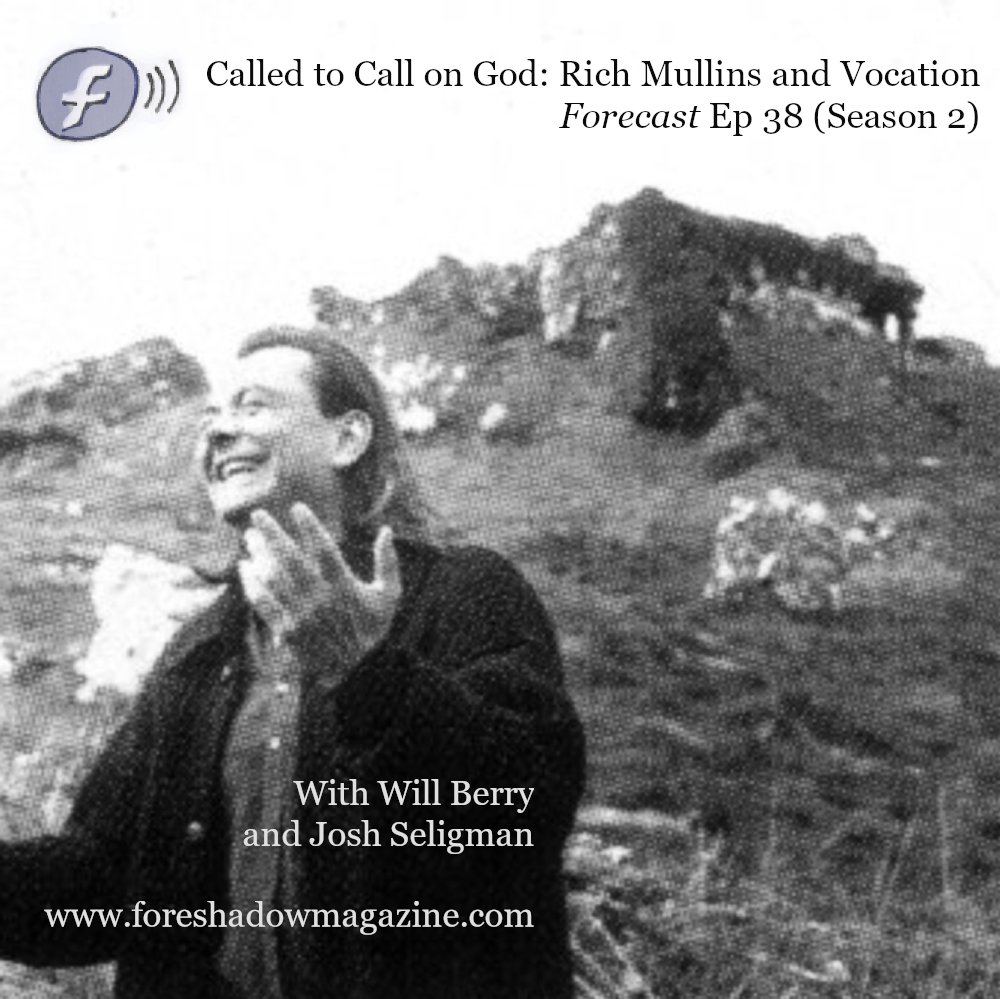
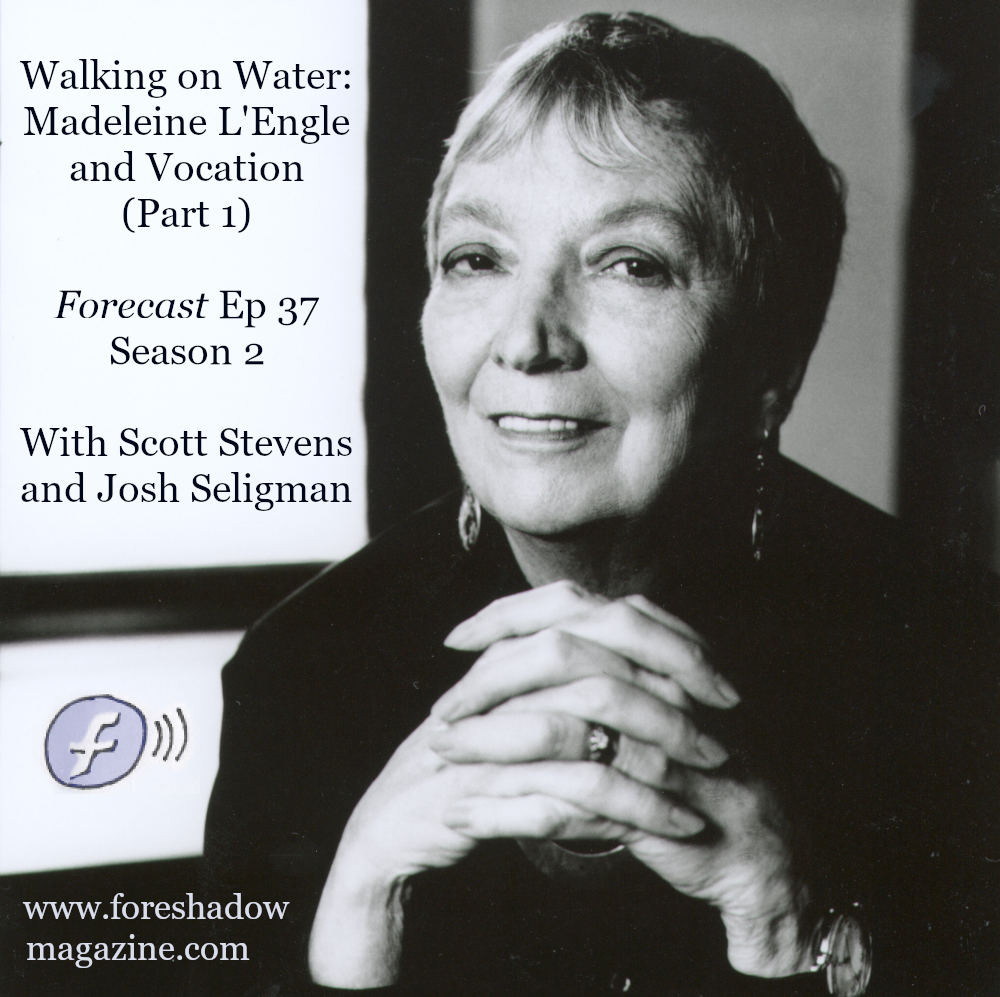

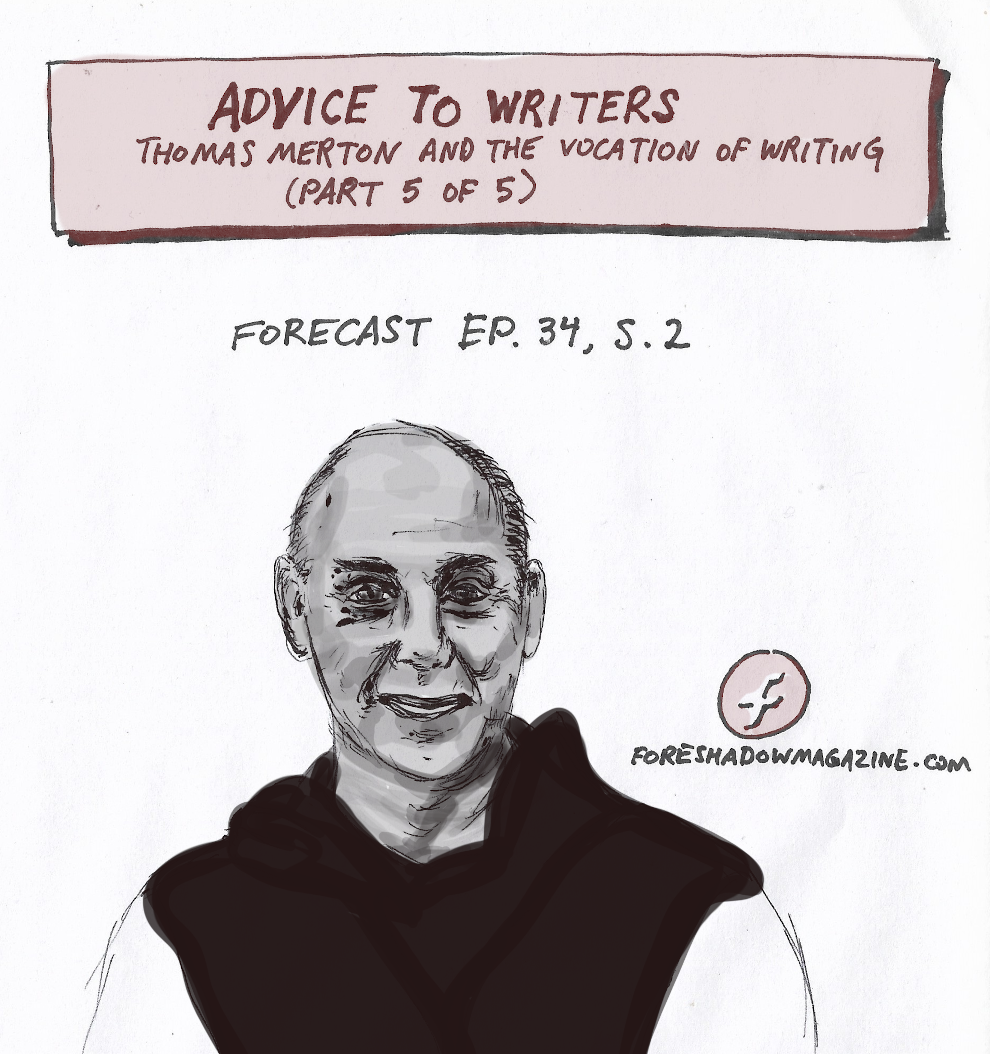
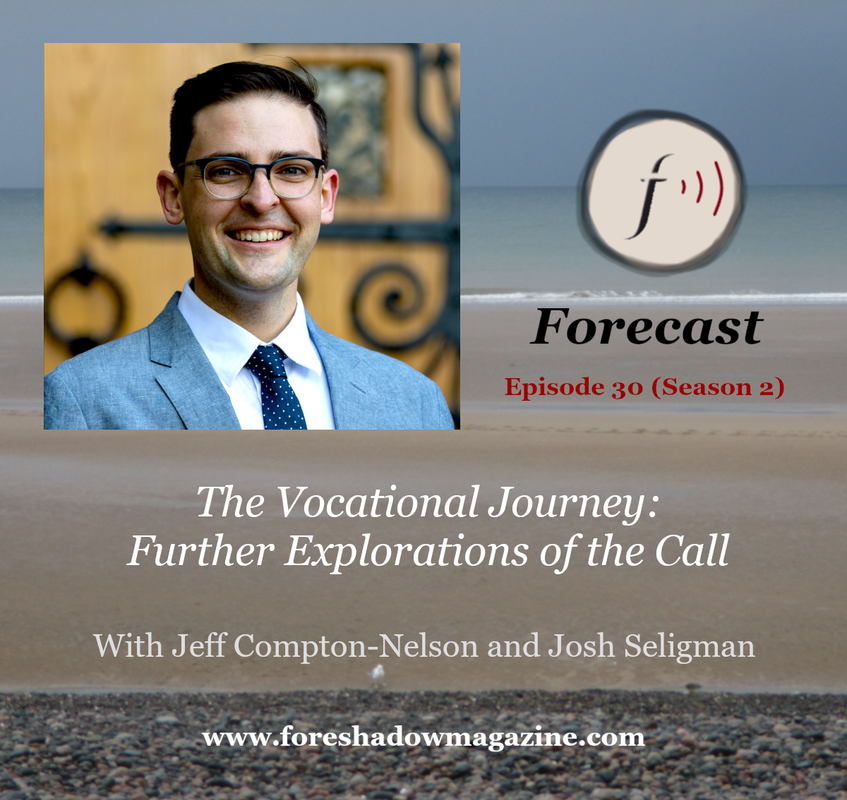
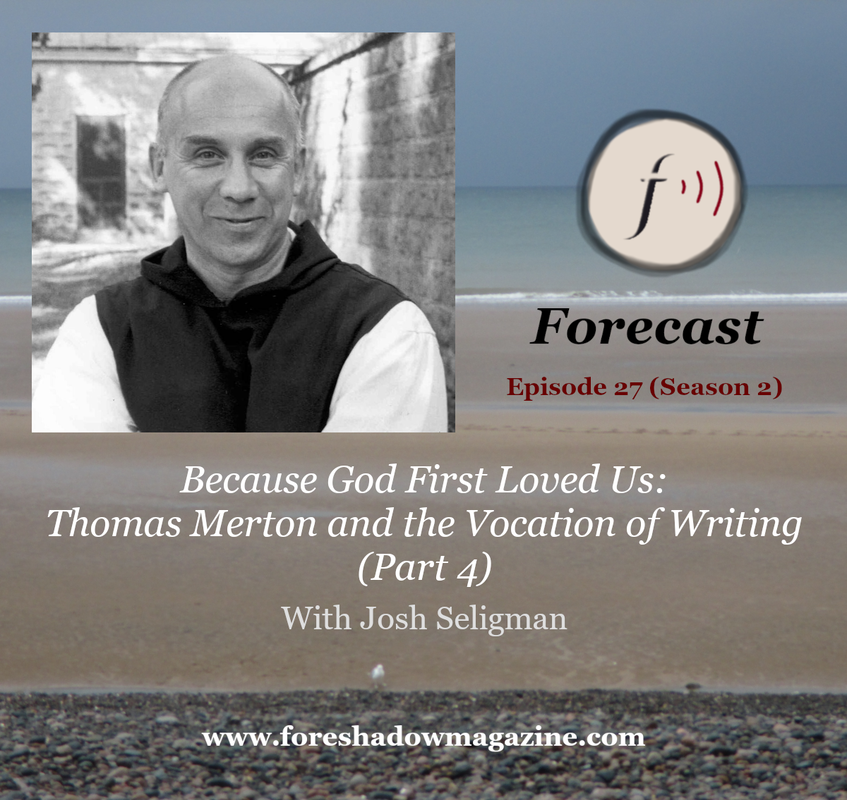
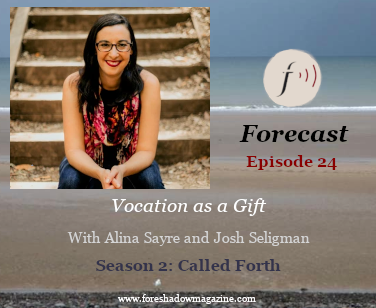
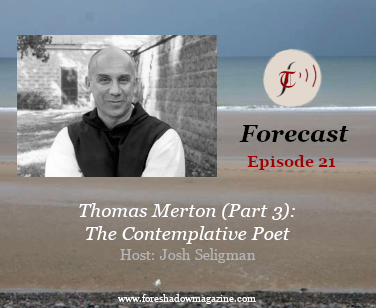
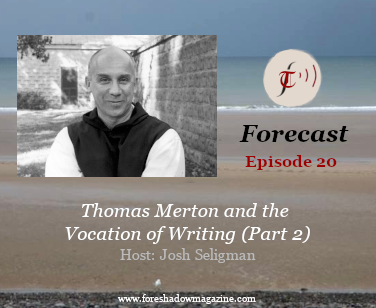
 RSS Feed
RSS Feed
